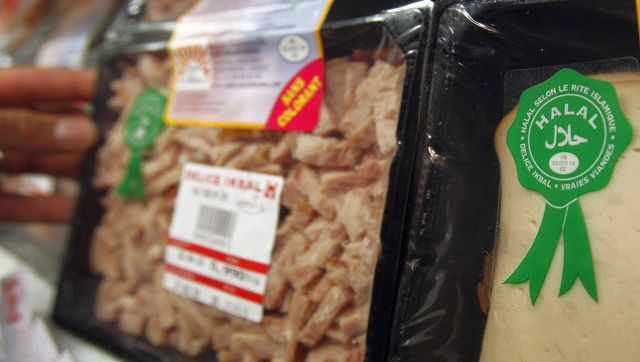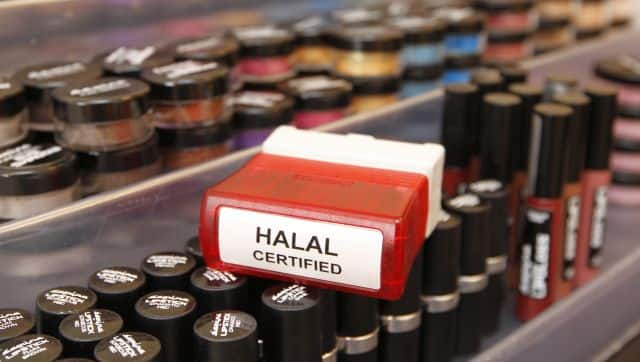The Uttar Pradesh government led by Yogi Adityanath made big headlines over the weekend. The state government on Saturday (18 November) passed an order, banning the production, storage, distribution, and sale of food, medicines and cosmetic items with halal certification in the state with immediate effect. The government in its order, however, clarified that export items were exempted from the ban. The
ban
comes after the Uttar Pradesh Police registered a case at the Hazratganj police station in Lucknow last Friday against a few organisations for allegedly exploiting people’s religious sentiments to boost sales by providing “forged” halal certificates. The case has been registered against organisations like Halal India Private Limited Chennai, Jamiat Ulama-i-Hind Halal Trust Delhi, Halal Council of India Mumbai, Jamiat Ulama Maharashtra and others under sections including 120B (criminal conspiracy), 153A (promoting enmity between different groups), 298 (uttering words, etc, with deliberate intent to wound the religious feelings), 384 (extortion) and 420 (cheating and dishonestly inducing delivery of property). But what is halal food? What does it mean? What is halal?
Halal
in Arabic means permissible and is the opposite to Haram, which translates to forbidden. Simply put, halal products mean those that are permissible by Islamic law. The term is usually associated with Islamic dietary laws to refer to food that is procured, processed, and traded in compliance with Islamic belief. The two items of food that are most commonly considered haram (non-halal) are pork (pig meat) and intoxicants (alcohol). Even meats that are not pork must satisfy specific requirements relating to their source, the way the animal was killed, and how it was processed, to qualify as halal. So, what qualifies meat to be halal? The criteria for halal meat pertain to the manner of the animal’s death. The Islamic way of slaughtering animals or poultry involves killing through a cut to the jugular vein, carotid artery, and windpipe. Animals must be alive and healthy at the time of slaughter and all blood should be drained from the carcass. During the process, a Muslim is expected to recite a dedication, known as tasmiya or shahada. Notably, halal is in contrast to the ‘jhatka’ method, which is preferred by many Hindus and Sikhs. In this method, a powerful, single blow to the back of the animal’s neck, decapitating it and then slaughtering it. What about other products? Can they be halal? As mentioned, halal refers to permissible and hence, it goes way beyond just dietary or meat restrictions. There are several aspects which the concepts cover besides how to select food or the quality, hygiene and safety aspects of the food consumed. Halal also includes wearing clothes or dressing appropriately, halal socialising, halal occupation, and a halal way of life, all according to Sharia law.
Also read: Halal is economic apartheid, but does jhatka movement have enough steam?
This explains the demand for halal products not only in the food industry, but also hotel, tourism, fashion, cosmetics and pharmaceutical industries as well as the banking sector and everything that involves the Muslim lifestyle. For instance, medicines often use animal by-products to create capsules or coverings. The halal consideration would be significant, as Muslims wouldn’t want to consume capsules containing gelatin made from pig-fat. [caption id=“attachment_13406192” align=“alignnone” width=“640”] Meat is considered halal when it is slaughtered in a particular way. Across the world, halal meat is sold after it is certified as so. File image/Reuters[/caption] What are halal certificates? Who issues them? In order to differentiate halal items from non-halal ones, a certificate is issued for halal products, informing the consumer that the product meets the standards. However, India doesn’t have an official regulator for the certification of halal products. Instead there are private companies that issue these certificates. Halal certification in India began in 1974 for meat and was extended to other products in 1993. But how is a company deemed the authority on halal and non-halal? They are recognised by Muslim consumers and have acquired recognition from regulators in Islamic countries. Earlier, the Commerce Ministry had said that meat products will be allowed to be exported as ‘halal certified’ only if they are processed and packaged in a facility that has a certificate by a body accredited by a board of Quality Council of India. According to an Hindustan Times report, the major halal-certifying organisations in the country include Halal India Pvt Ltd and Jamiat Ulama-i-Hind Halal Trust. The International Halal Accreditation Forum is an international network of accreditation bodies mandated to enforce halal standards in their economies. Indonesia, Malaysia, Thailand, the Philippines, the UAE, and Pakistan have their own halal standards. [caption id=“attachment_13406202” align=“alignnone” width=“640”]
Meat is considered halal when it is slaughtered in a particular way. Across the world, halal meat is sold after it is certified as so. File image/Reuters[/caption] What are halal certificates? Who issues them? In order to differentiate halal items from non-halal ones, a certificate is issued for halal products, informing the consumer that the product meets the standards. However, India doesn’t have an official regulator for the certification of halal products. Instead there are private companies that issue these certificates. Halal certification in India began in 1974 for meat and was extended to other products in 1993. But how is a company deemed the authority on halal and non-halal? They are recognised by Muslim consumers and have acquired recognition from regulators in Islamic countries. Earlier, the Commerce Ministry had said that meat products will be allowed to be exported as ‘halal certified’ only if they are processed and packaged in a facility that has a certificate by a body accredited by a board of Quality Council of India. According to an Hindustan Times report, the major halal-certifying organisations in the country include Halal India Pvt Ltd and Jamiat Ulama-i-Hind Halal Trust. The International Halal Accreditation Forum is an international network of accreditation bodies mandated to enforce halal standards in their economies. Indonesia, Malaysia, Thailand, the Philippines, the UAE, and Pakistan have their own halal standards. [caption id=“attachment_13406202” align=“alignnone” width=“640”] Halal is not just restricted to meat. There is also a demand for halal products in the food industry, but also hotel, tourism, fashion, cosmetics and pharmaceutical industries. File image/Reuters[/caption] What’s behind the UP halal ban? The UP government in its order banning halal products said that halal certification was a parallel system that creates confusion and was untenable under Section 89 of the Food Law Food Safety and Standards Act. In its order, the state said, “The right to decide the quality of food items lies only with the authorities and institutions given in Sections 29 of the said Act, who check the relevant standards as per the provisions of the Act.” It further argued that issuing halal certificates for products like oil, soap, toothpaste etc suggests a deliberate criminal conspiracy targeting a specific community. The ban is in the interest of public health and to prevent confusion. The government further stated that these companies forge halal certificates to boost their financial gains, fostering not only social animosity but also violating public trust. According to the complainant, these companies were “amassing disproportionate profits and potentially channelling funds towards supporting terrorist organisations and anti-national endeavours”. What has been the reaction to the halal ban? Jamiat Ulama-i-Hind Halal Trust, one of the companies against whom the case was filed last Friday, termed the allegations baseless and said that they were aimed at “tarnishing their image”. The company added that it would take necessary legal measures to counter the misinformation. The firm said its certification process aligned with the requirement of manufacturers for both export and domestic distribution in India, and that it adhered to government regulations requiring all Halal Certification bodies to be registered by the National Accreditation Board for Certification Bodies under Quality Council of India. Niaz A Farooqui, CEO of Jamiat Ulama-i-Hind Halal Trust told The Wire that the ban on halal certificate products in UP would impact the manufacturers and sellers of these products which cut across communities. “This is not about meat but other items.” Mufti Habeeb Yusuf Qasmi, president of the Halal Council of India, expressed his views on the matter. He countered the allegation that companies issuing halal certificates were trying to promote the businesses of only one community. “This is absolutely false. Venky’s, Zorabian and Godrej (companies certified by the Halal Council of India) are all run by non-Muslims,” Qasmi told The Wire, stressing that Halal certification had in fact benefitted the businesses of non-Muslim firms. With inputs from agencies
Halal is not just restricted to meat. There is also a demand for halal products in the food industry, but also hotel, tourism, fashion, cosmetics and pharmaceutical industries. File image/Reuters[/caption] What’s behind the UP halal ban? The UP government in its order banning halal products said that halal certification was a parallel system that creates confusion and was untenable under Section 89 of the Food Law Food Safety and Standards Act. In its order, the state said, “The right to decide the quality of food items lies only with the authorities and institutions given in Sections 29 of the said Act, who check the relevant standards as per the provisions of the Act.” It further argued that issuing halal certificates for products like oil, soap, toothpaste etc suggests a deliberate criminal conspiracy targeting a specific community. The ban is in the interest of public health and to prevent confusion. The government further stated that these companies forge halal certificates to boost their financial gains, fostering not only social animosity but also violating public trust. According to the complainant, these companies were “amassing disproportionate profits and potentially channelling funds towards supporting terrorist organisations and anti-national endeavours”. What has been the reaction to the halal ban? Jamiat Ulama-i-Hind Halal Trust, one of the companies against whom the case was filed last Friday, termed the allegations baseless and said that they were aimed at “tarnishing their image”. The company added that it would take necessary legal measures to counter the misinformation. The firm said its certification process aligned with the requirement of manufacturers for both export and domestic distribution in India, and that it adhered to government regulations requiring all Halal Certification bodies to be registered by the National Accreditation Board for Certification Bodies under Quality Council of India. Niaz A Farooqui, CEO of Jamiat Ulama-i-Hind Halal Trust told The Wire that the ban on halal certificate products in UP would impact the manufacturers and sellers of these products which cut across communities. “This is not about meat but other items.” Mufti Habeeb Yusuf Qasmi, president of the Halal Council of India, expressed his views on the matter. He countered the allegation that companies issuing halal certificates were trying to promote the businesses of only one community. “This is absolutely false. Venky’s, Zorabian and Godrej (companies certified by the Halal Council of India) are all run by non-Muslims,” Qasmi told The Wire, stressing that Halal certification had in fact benefitted the businesses of non-Muslim firms. With inputs from agencies
What are halal-certified products that UP has banned?
FP Explainers
• November 20, 2023, 11:29:30 IST
Uttar Pradesh has imposed a ban on all halal-certified items, stating that it was being done in the interest of public health and to prevent confusion. Halal products are those that are defined as ‘permissible’ by Islamic law. Initially, related to food, it has expanded to medicines, and much more
Advertisement
)
End of Article